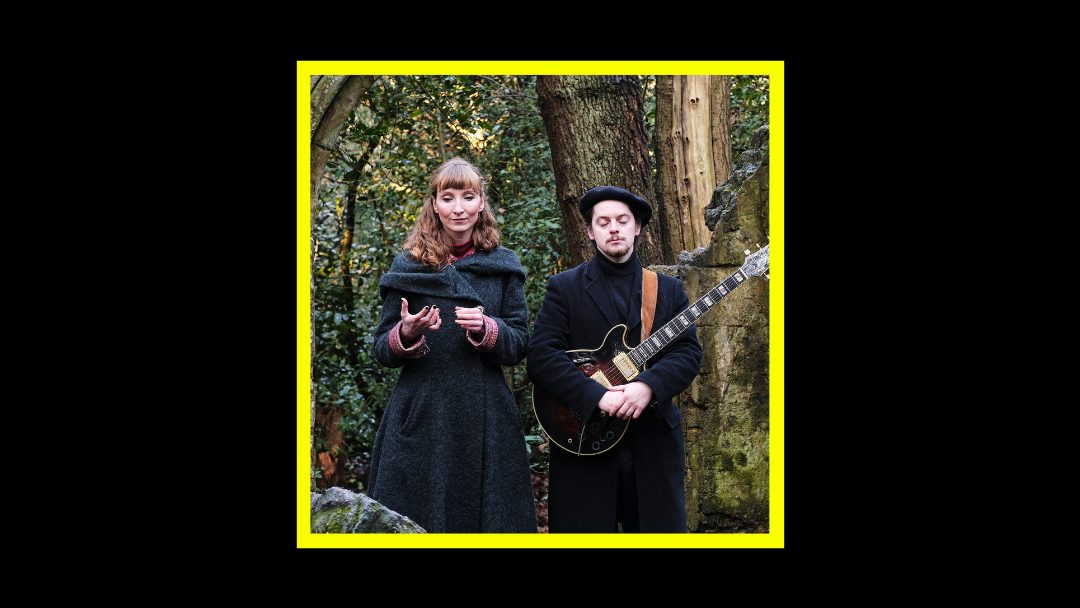As Long As Songbirds Sing: la migrazione del folk
James Kitchman (chitarra) e Sylvia Schmidt (voce) si sono incontrati nel 2014, sul palco di una delle jam session notturne di Londra. Il duo condivide un’affinità condivisa per le ballate folk anglo-americane dei monti Appalachi. Spinti dalla passione per questa musica tradizionale è nato l’album di debutto As Long As Songbirds Sing, pubblicato il 27 novembre 2020.
English
Tell us how you met and how the idea of this album was born.
James Kitchman: We met on stage at a late-night jam session in London. I remember that we had a great musical chemistry right away. When we started playing regularly it quickly became apparent that we both love taking songs on a journey that we cannot predict. And in doing this together we found that we kept surprising and supporting each other in quite a natural way. It felt exciting, fresh and intuitive to play with Sylvia.
As Long As Songbirds Sing: why did you choose this title? Do Songbirds represent you?
This title comes from a line in the song Go ‘Way From My Window. Apart from being an evocative lyric, As Long As Songbirds Sing seemed to jump out as a title because these songs had travelled to America from England, Scotland, and Ireland and somehow found their way to us so many years later. The migratory aspect of the folklore resonated with the birds and created a sense in us of what it was all about.
Both of you have a jazz background, while the songs in the album are reinterpretations of traditional folk songs. Could you try to describe to us the style of your work, would you place it somewhere in between folk and jazz?
We took influence from John Jacob Niles, a song-collector and composer from America, who while capturing the essential experience of a folk song, would interpret it through the lens of his own personality. This approach resonated with both of us and gave us a sense of permission to take some liberties with this music. I think it comes down to whether you want to label things and if so, how you then define a particular style. For me, it’s about finding what resonates with you personally, and building a bridge forward with it.
Black Is The Colour has a surprising sound, almost like a song to play in a cathedral. Kitchman’s guitar manages to fill the empty spaces despite the fact that the song is only guitar and voice. Which effects did you use for this track? In the first part it almost sounds like an organ!
This old song is special to me. I heard Nina Simone’s recording of it when I was a kid, and was reminded of it’s charm and beauty when I heard the great British pianist Kit Downes perform a haunting version on church organ in London a few years ago. I still had this in my head when I learnt the song and I wanted to pay homage to that inspiration on the record. The sounds at the beginning are me playing my guitar into a sampler with the dry guitar signal at zero. The result is that the notes are completely sustained, evoking the sound of an organ. I then manipulate that sound, sending it into a chain of pitch shifters and filters, before Sylvia sings the opening line of the song.
The climax of the album is definitely Lowlands, which summarizes perfectly the mysterious nature of this album. Was this unsettling, enigmatic atmosphere something that you meant to create or was it just the result of a spontaneous creation process?
I had been experimenting with looping and reversing my guitar for a few years prior to this recording and I think at this point I had figured out a way of manipulating the pitches in the loop, to distort them in interesting ways. I tried to follow the story of the lyrics and react to them in the moment with my effects pedal. While I’ve had to learn how to control it, I still don’t know exactlywhat it will do and therefore it is different each time. I would say therefore it was both intentional and spontaneous!
Why did you choose to start I’m Going Away with Brecht’s Das Elfte Sonett?
When we got together to rehearse some of the songs before recording and it came to I’m Goin’ Away, I said I was going to bring the song in with some atmospheric guitar sounds. After a minute or so, Sylvia began reciting this poem in German, before we arrived at the beginning of the song. Although it took me by surprise, the sound of Sylvia’s spoken word against my guitar loops seemed to mesh together and lead to the song organically. I later learnt from her that the Brecht poem describes other in the warmest clothing to send them safely on a long journey, hoping that they and their affection how one lover would wrap the would return unharmed. This matches the mood and sentiment of I’m Goin’ Away, a love song from North Carolina.
In these difficult times, what can musicians do to contribute to make this new pandemic world a better place, and what could public institutions do to help musicians?
I think musicians and artists are making the world a better place, simply by being in it! Can you imagine a world without any? With regard to helping musicians, I would like to see some positive change come out of the current discussion on streaming revenues for artists, and I hope that live music will make a triumphant return very soon!
Italiano
Raccontateci come vi siete conosciuti e come è nata l’idea del disco.
James Kitchman: Ci siamo incontrati sul palco di una jam session in tarda serata a Londra. Ricordo che notammo una grande chimica musicale tra noi due sin dal principio. Quando cominciammo a suonare regolarmente insieme, sembrò evidente che avevamo un debole per l’improvvisazione, accompagnando i brani in viaggi imprevedibili. Dato che facciamo tutto questo insieme, ci sorprendiamo e supportiamo a vicenda in una maniera piuttosto naturale. Suonare con Sylvia è emozionante e intuitivo, come una ventata d’aria fresca.
As Long As Songbirds, perché questo titolo? Vi sentite due “Songbirds”?
James Kitchman: Il titolo è ispirato ad un verso di “Go ‘Way From My Window”. Tralasciando il valore evocativo del testo, “As Long As Songbirds Sings” era un titolo che catturava l’attenzione dato che questi brani hanno viaggiato dall’America all’Inghilterra, alla Scozia, fino in Irlanda, per poi trovare la strada che li ha condotti a noi anni ed anni dopo. L’aspetto migratorio del folklore che risuona e si traduce nell’immagine degli uccelli: è questo ciò che volevamo comunicare.
Entrambi venite dal mondo jazz mentre le canzoni del disco sono una reinterpretazione di canzoni folk tradizionali. Provate a descriverci lo stile del disco, dove lo collochereste tra il folk e il jazz?
James Kitchman: Ci siamo ispirati a John Jacob Niles, un collezionista e compositore americano, il quale interpretava, con la sua propria personalità, l’esperienza essenziale di un brano folk. Ci sentivamo attratti da questo approccio e ci ha dato un senso di spensieratezza che ci ha permesso di prenderci alcune libertà in fase di creazione. La questione è se vuoi davvero etichettare uno stile, e se lo facessi, dovresti anche essere in grado di definirne i particolari. Per me, alla fine è tutta una questione personale, fatta di sensazioni da percepire e ampliare.
Black Is The Colour sorprende per il modo in cui suona, quasi da canzone da cattedrale. La chitarra di Kitchman riesce a riempire gli spazi vuoti nonostante il brano sia solo voce e chitarra. Quali sono gli effetti utilizzati dalla chitarra visto che nella prima parte suona come un organo.
James Kitchman: Questa canzone è speciale per me. Ascoltai la versione di Nina Simone quando ero un bambino, e la versione del pianista Kit Downes con un organo a Londra di un paio di anni fa mi ha fatto ricordare tutto il suo charme. Si tratta di un brano che non mi ha mai lasciato, e volevo rendere omaggio a questa fonte di ispirazione. I suoni iniziali sono miei mentre suono la chittara in un sampler con il segnale dry guitar impostato su zero. Il risultato è che le note sono producono un suono che richiama quello di un organo. Successivamente, ho manipolato quel suono, processandolo con una catena di filtri e shifter di pitch, giusto prima che Sylvia entri in scena nella canzone.
Il momento clou del disco è sicuramente Lowlands che riassume perfettamente la natura misteriosa del disco. È stata una cosa voluta la natura misteriosa e inquietante del disco o è nata spontaneamente?
Ho sperimentato per diversi anni con loop e reversing prima di questo lavoro e credo di aver trovato un mio modo di manipolare i pitch e i loop, distorcendoli in modalità interessanti. Ho provato a seguire la storia dei testi ed a reagire agli stimoli tramite le mie pedaliere. Si tratta di un processo di apprendimento costante per trovare una forma di controllo, ma ancora adesso non so esattamente quali sono i risultati di queste sperimentazioni, e quindi il risultato è differente ogni volta. Direi che il risultato è un misto tra un processo creativo spontaneo ed uno meticolosamente progettato.
I’m Going Away’ Schmidt legge Das Elfte Sonett. Come mai la scelta di aprire questa canzone con la poesia di Brecht.
Quando ci siamo incontrati per fare un reharsal di alcuni dei brani e abbiamo suonato “I’m Goin’ Away”, avevo annunciato che avrei aggiunto alla canzone alcuni suoni d’atmosfera con la chitarra. Dopo più o meno un minuto, Sylvia comincia a recitare questo poema in tedesco, prima ancora di iniziare la canzone. Nonostante mi abbia preso alla sprovvista, il suono delle parole di Sylvia e i miei loop di chitarra si son semplicemente uniti e hanno poi portato alla creazione del brano. Ho solo successivamente saputo da lei che il sonetto di Brecht descrive come donare dei vestiti caldi prima di un lungo viaggio sia sinonimo di affetto, Come se il proprio amato fosse avvolto, protetto e sarebbe tornato a casa sano e salvo. Questo sonetto e queste emozioni combaciano con quelle di I’m Goin’ Away, una canzone d’amore dal Nord Carolina.
In questo periodo storico così difficile, cosa possono fare i musicisti per contribuire ad alleviare questa situazione pandemica e cosa possono fare le istituzioni per i musicisti?
Penso che musicisti e artisti rendano il mondo un posto migliore solo per il semplice fatto che essi esistono! Riesci ad immaginare un mondo senza?
Riguardo l’aiutare i musicisti, vorrei vedere un cambiamento positivo uscire fuori da questa grande discussione che si sta avendo riguardo i guadagni per gli artisti quando si tratta di streaming. Spero che la musica dal vivo faccia un ritorno in scena in grande stile il più presto possibile!
Leggi la recensione dell’album “As Long As Songbirds Sing” QUI
Nato a Caserta nel 1989, innamorato folle della musica, dell’arte e del basket. Nel lontano 2003 viene letteralmente travolto dal suo primo concerto, quello dei Subsonica, che da quel giorno gli aprirono un mondo nuovo e un nuovo modo di concepire la musica.
Cresciuto col punk e la drum and bass, ama in maniera smoderata l’elettronica, il rock e il cantautorato. Fortemente attratto dal post-rock, dalla musica sperimentale e da quella neoclassica, non si preclude all’ascolto di altri generi definendosi un onnivoro musicale.
[gs-fb-comments]



Commenti recenti